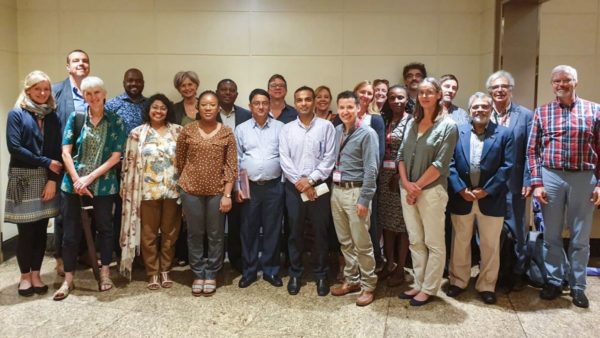4 March 2020 · Global Partnership for Zero Leprosy
Operational Excellence Group Takes a New Shape for 2020 and Beyond

GPZL’s Operational Excellence Working Group was founded to foster the development, use, scale-up, monitoring, and evaluation of best practices and promising innovations in National Leprosy Control Programmes. This group has contributed enormously to establishing GPZL’s Zero Leprosy Toolkit and Country Review Tool in the last two years. These products will always be living products in need of regular updates, but work on them will not continue with the same intensity.
In light of this, the Operational Excellence Steering Team met in September 2019 to discuss the future role of the Operational Excellence Working Group. Discussions in that meeting, and the GPZL Strategy Workshop in Amsterdam in January 2020, shaped a plan for members of the Operational Excellence Working Group to continue their contributions to the successful implementation of the GPZL Action Framework 2020-2030. The activities are diverse and sometimes time-bound, and offer opportunities for people to contribute within their field of expertise, interest, and available time.
The following are opportunities for continued engagement for Operational Excellence Working Group members:
- Engagement in Country Programs: Members living and working in countries where the GPZL engages in country support will be actively involved in the various activities, such as the National Leprosy Programme Review, Roadmap design, and National Action Plan development. Each year from 2020-2025 GPZL will engage in five or more countries, with the aim of developing Zero Leprosy Roadmaps in 30 countries by the end of 2025.
- Providing Technical Support: Interested members have been asked to provide their CV to be considered for involvement in National Leprosy Programme Reviews in other countries. We are building a pool of experts to facilitate reviews. If you are interested and have guidance to offer in a specific field of expertise, please join the GPZL Technical Support Pool. To join the Technical Support Pool, please complete this form.
- Providing support to the Zero Leprosy Toolkit Helpdesk: The Zero Leprosy Toolkit offers a selection of freely accessible best practices online. The documents have been designed to be easy to understand, nevertheless, some toolkit users may have questions, or may request to be in contact with an author of a best practice to acquire more information. Members that have contributed to the best practices can offer this support. The GPZL secretariat will facilitate this by reaching out to authors when questions are received. Another area in which members can offer support is in the translation of best practices. Currently all of the best practices are in English, but we welcome support in translating these into French and Portuguese. Members who are willing to offer translation help can email Andie Tucker at atucker@taskforce.org.
- Participate in technical meetings and events: Each year, technical meetings and events are organized by various partners of the GPZL (i.e. ILEP, WHO, SHF, NNN meeting). These meetings are announced on our website. GPZL co-organizes some of these meetings (i.e. SDR-PEP Workshop in Amsterdam, 2019), and members of the Operational Excellence Group may either participate as co-organizers, or join as participants.
- Engage with a Thematic Research Group: The Research Agenda Working Group was dissolved at the end of 2018 after producing a Research Agenda with 9 priority areas for research. In 2019, GPZL established thematic research groups to discuss and develop fundable research proposals. These thematic areas are: Diagnostics; Operational research issues; SDR in PEP; Stigma. The link between research and operations is key in defining relevant research questions upon which to base proposals. Members of the Operational Excellence Working Group can play an active role in helping to define relevant questions. Further information about how members of the Operational Excellence Working Group can engage in these thematic research groups will be forthcoming.